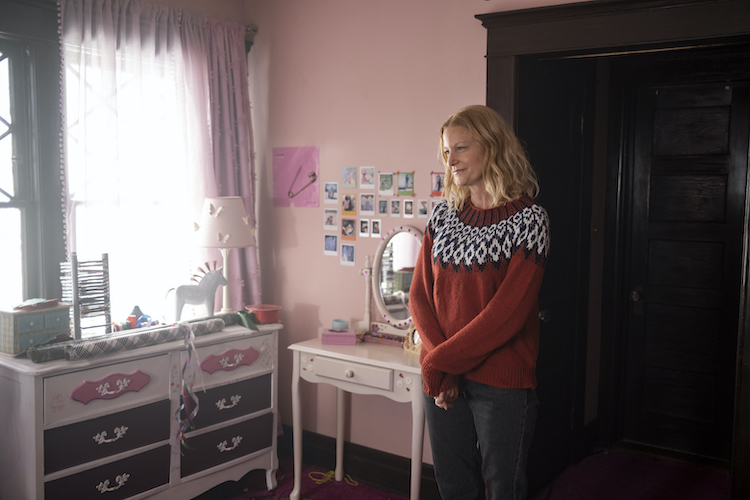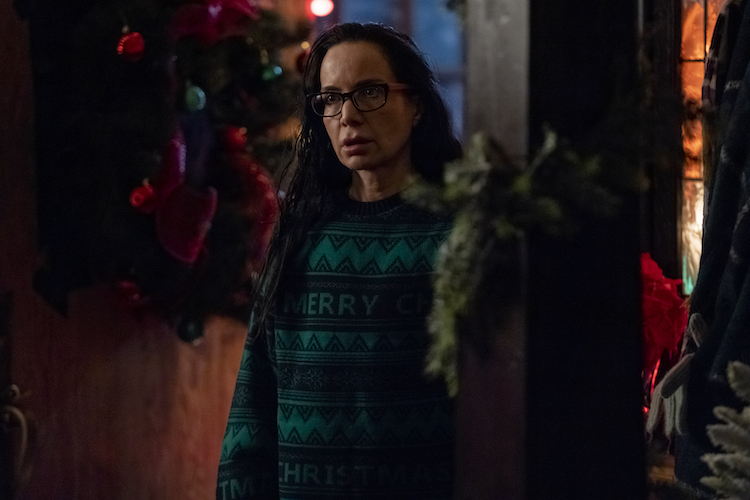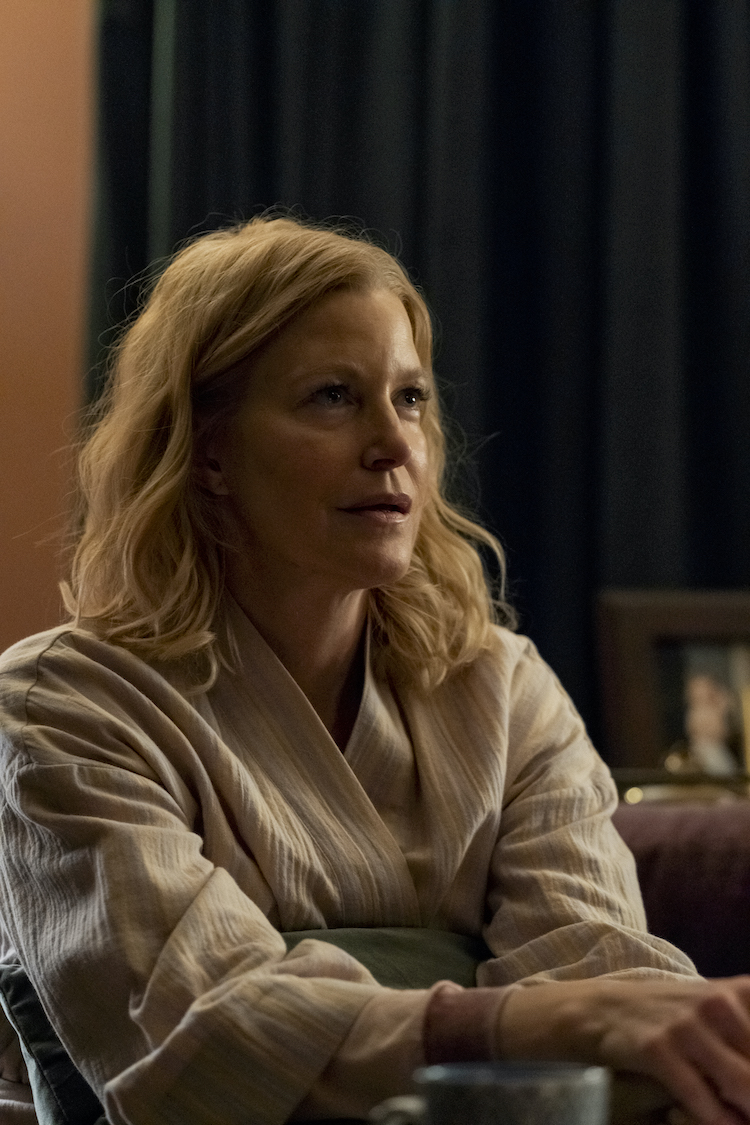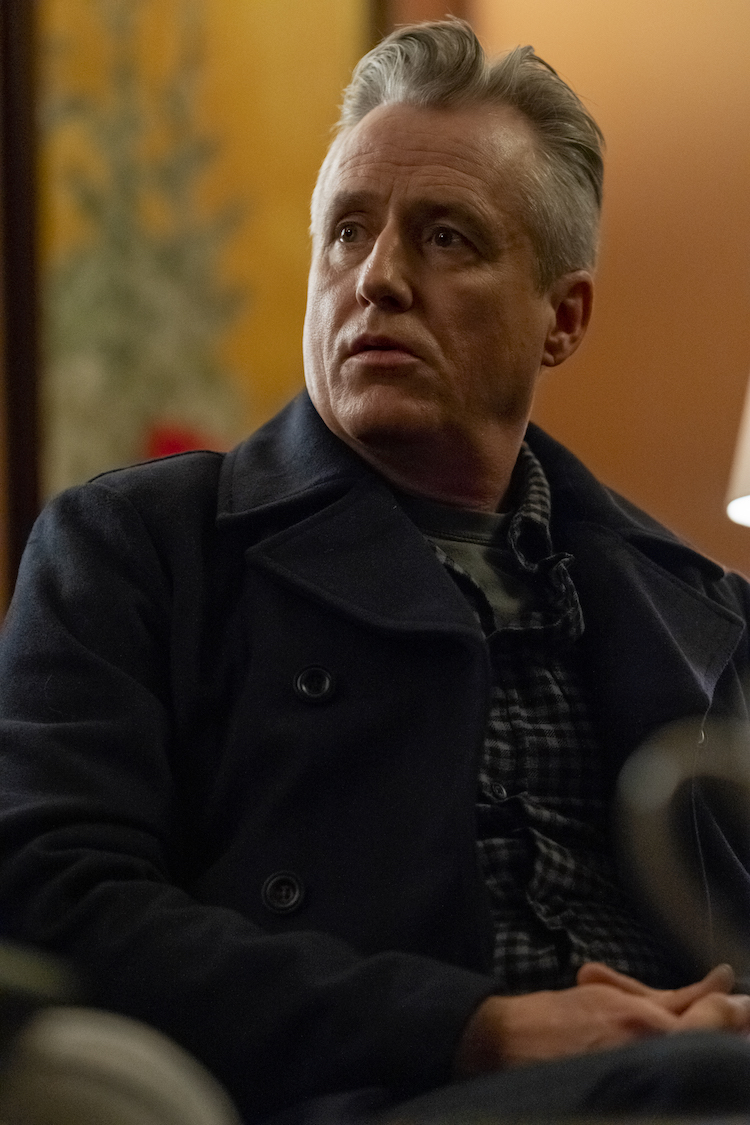Hey, friends. Barbarella here. Every once in a while, a director makes a splash with a first feature, and Alison Star Locke wrangles some serious star power in Anna Gunn (Breaking Bad), Linus Roache (Law and Order: SVU), and Janeane Garofalo (Mystery Men) for her debut undertaking, The Apology.
In The Apology, a recovering alcoholic gets an unexpected visitor on Christmas Eve, twenty years after the disappearance of her daughter. The film doesn’t just expose the long-term impact of having a missing child and the toll that takes, but it also examines compassion, change, revenge, and the bonds that people have. The fascinating character study may not blend well with any sort of feel-good holiday vibe, but it definitely has some things to say about humanity and warrants discussion after viewing, so be sure to have someone nearby for that. The Apology will be in theaters and streaming on Shudder and AMC+ this Friday, December 16. I had the opportunity to speak with Alison, who described her writing process, her inspiration for the film, and her experience helming The Apology. Check it out!
![[L-R] Anna Gunn as Darlene Hagen and Linus Roache as Jack Kingsley in the thriller, THE APOLOGY, an RLJE Films, Shudder and AMC+ release. Photo courtesy of RLJE Films /Shudder/AMC+. [L-R] Anna Gunn as Darlene Hagen and Linus Roache as Jack Kingsley in the thriller, THE APOLOGY, an RLJE Films, Shudder and AMC+ release. Photo courtesy of RLJE Films /Shudder/AMC+.](https://media.aintitcool.com/media/uploads/article_images_2022/barbarella/theapology_still_1.jpg) You made your start in reality TV. How does one transition from that to making a feature like The Apology?
You made your start in reality TV. How does one transition from that to making a feature like The Apology?
“Yes, it was quite the interesting journey to go from reality to this. I worked in reality as a story producer for a long time, but I had gone to film school at USC, and I made a bunch of really wonderful friends there. One of them was Stacy Jorgensen, and she is one of the producers on this film. Throughout my life, I've just been writing, writing, writing. [I’ve been] writing feature scripts, making shorts, all of that sort of thing, and then my daughter was diagnosed with autism. She needed me, so I was home with her for years.
"Finally, when my daughter was starting to feel more comfortable, to be doing better, I went to Stacy – she had left acting and went into full-time producing – and I said, "I feel like the work that you're doing is in the same sandbox of what I want to do. Could you just take a look at this script and tell me if you think of anybody I could send it to?" My expectations were to the floor, not any knock on Stacy – she’s a magician – but it was just the way that the business works. I sent it to her, and she was like, "Actually, I want to produce it, and I'm going to try to get my company on board." She has just been a total champion, and now I have this incredible all-female producing team: Kim Sherman, who was my real creative partner on this, and Stacy, who was my champion, and Lisa Whalen, who's the CEO at Company X. [All of them just backed] me every step. They saw it through, and here we are.”

I love talking to writers because I'm always curious about different people's writing processes. What is your writing process?
“Well, a woman after my own heart. I love learning about every writer's process, as well. Mine is I kind of take a page from Shirley Jackson, who's my hero. She was a housewife at first, back when they would call it a housewife. And she would basically have notebooks and things all over her house, and she would just be typing while she's cooking dinner and doing all this sort of thing. Over the years, being home with my daughter, I learned the perfect writing session doesn't exist for me. It’s a lovely dream; it happens sometimes. I've gotten better at [thinking], “Okay, now she's in school. I can sit and focus more,” but really, it's about just stealing your time as much as you can.
“I tend to just brainstorm it and then start putting it on cards. I have a giant corkboard. I put each scene on the cards, and then I start to script the pages. I'm not a huge outliner. I'll try to do it, and then it just ends up feeling like I'm taking the steam out of it too soon. My big love is just knowing that that first vomit-draft is pain, and we'll just let that go. The real craft and the real fun of it is the rewriting. I just talk to people about it constantly, too. I know some writers really like to keep it private, but for me, I work out the best, I think, talking through things, talking to people about it to see what's kind of flowing and realizing what's actually important to me about the story. My husband's a writer and editor, and of course, I have a lot of creative friends.
 “When I was writing The Apology, I was like, "What is going to happen in the basement?" That was a big thing I was stuck on: What happens in the basement? And that would be what this movie was for me. I literally had my kid's construction paper, and I'm writing choose your own adventure, this one and this. And I'm like, "Okay, all of these would be fine, but what are you trying to say with the film? What do you want it to be?" And so, I was like, "Okay, option C or whatever." Yeah, I just keep fluid about it.
“When I was writing The Apology, I was like, "What is going to happen in the basement?" That was a big thing I was stuck on: What happens in the basement? And that would be what this movie was for me. I literally had my kid's construction paper, and I'm writing choose your own adventure, this one and this. And I'm like, "Okay, all of these would be fine, but what are you trying to say with the film? What do you want it to be?" And so, I was like, "Okay, option C or whatever." Yeah, I just keep fluid about it.
“I love writing to film scores. That's the most effective thing to me. Sometimes I have some playlists of just badass ladies’ playlists to get me in the right mood, or really cheesy music, too. My writer's group makes fun of me because I love to write to Air Supply, but it works. It's operatic. It's like everything is just like, the feelings are up here. It helps me pull the drama out a little bit more.”
I get that. I totally get that. The Apology is quite the character study, and it covers a range of human experiences like depression, trauma, guilt, revenge. Was one of those the genesis for the story? And if not, what was?
“Yeah, so the genesis for the story was that I was always fascinated with true crime stories and always felt a lot of empathy for the victims and their families and everything surrounding that. So then, as cheesy and cliché a writer thing as it sounds, I had a dream one night, where it was the middle of the night, and I heard a knock on my front door, and there was a man on the other side of the door. He said, "I want to come in. I need to tell you what happened to your daughter. I know what happened.” And I woke up like, "What? Nothing's wrong with my daughter!”
 “As I was writing it, I realized that I was really writing about the experience of being there for my daughter, how exhausting and obsessive it became for me. That’s where that comes from. It’s wonderful to be a parent, and she is my dream come true, but it is extremely exhausting. When you add all of that bureaucracy that you have to deal with when your kid has any sort of differing need, it was like I just found myself connecting to these searching families and what they would go through in terms of just these grounded problems that they would be dealing with, organizing their papers and who they have to call to bug this week and all these sorts of things. It just made me feel connected to it, so that's where it came from.”
“As I was writing it, I realized that I was really writing about the experience of being there for my daughter, how exhausting and obsessive it became for me. That’s where that comes from. It’s wonderful to be a parent, and she is my dream come true, but it is extremely exhausting. When you add all of that bureaucracy that you have to deal with when your kid has any sort of differing need, it was like I just found myself connecting to these searching families and what they would go through in terms of just these grounded problems that they would be dealing with, organizing their papers and who they have to call to bug this week and all these sorts of things. It just made me feel connected to it, so that's where it came from.”
Very cool. Would you talk about getting the cast on board and what it meant to you having actors of that caliber for your feature debut? I mean, that's amazing.
“Talk about a Christmas gift, right? Yeah. I still can't believe it. It was such an experience. I was so terrified at first. Am I going to just come off as a big dweeb? But yeah, so I met with Anna, and we just really connected as moms. We both felt a responsibility to try to do justice to all of those complicated feelings that are in the script. I just feel like there's so many young women whose losses have just been seen as disposable, as not important enough, and we both felt a big calling about that.
“And Linus and I, right away we had a great conversation about what we were going to explore in terms of masculinity, in terms of gender expectation and how toxic that sort of thing can be, and really making sure that Jack was going to be a person really with his own internal logic, that he had warmth and kindness to him, also. For me, that makes it much scarier, much more complicated, much more relatable, because I think it's easier to not think about this violence against women if we just say that they're these evil men. Instead, this is an act of evil; where did that come from? We want to feel that. We don't want this to keep happening. We would have these really fantastic conversations about that.
 “And Janine and I, she's so funny because she's so much less in depth in terms of what she wants to talk about in each line. It would be like, I'd say “You are almost the surrogate for the audience. You are all of us observing this sort of thing all of the time and taking that in,” and she'd go, "Got it. Okay, got it." Also, I'm really obsessed with girlfriends on screen. I want to see more girlfriend relationships, best BFFs on screen, so I was like, "Here we go. We got Anna and Janine as this fantastic duo of the ride-or-die girlfriends." It was really fun to create that with them.”
“And Janine and I, she's so funny because she's so much less in depth in terms of what she wants to talk about in each line. It would be like, I'd say “You are almost the surrogate for the audience. You are all of us observing this sort of thing all of the time and taking that in,” and she'd go, "Got it. Okay, got it." Also, I'm really obsessed with girlfriends on screen. I want to see more girlfriend relationships, best BFFs on screen, so I was like, "Here we go. We got Anna and Janine as this fantastic duo of the ride-or-die girlfriends." It was really fun to create that with them.”
What was the biggest obstacle that you had to overcome in getting The Apology made, and how did you overcome that?
“I think the biggest obstacle was just getting over my own imposter syndrome, just me getting out of my own way, really believing that I have a voice that's worth listening to, that I know what I'm doing. All of those things, I think, happen to most creative people. I don't know, it's almost like this little secret. Everybody thinks it's just them. It's like, no, it's everybody. It's all the time. It’s just something to constantly battle. Also, just the emotion of being on set after being home with my daughter was so moving. I would look over and Stephanie Houser, who was our chief lighting technician, would have her iPad, and she's doing her thing. She’s just this very inspiring woman making it happen on the set of this thing that I dreamed up. It was very emotional, but it was so great, too. I mean, we had, of course, all the indie film challenges. Not enough days, weather wasn't our friend. But what are you going to do? I had a great team, I mean, a dreamboat team.”
If you want to check out Anna Gunn, Linus Roache, and Janeane Garofalo in Alison Star Locke’s feature debut, The Apology will be in theaters, on Shudder, and on AMC+ this Friday, December 16. Check out the trailer.
